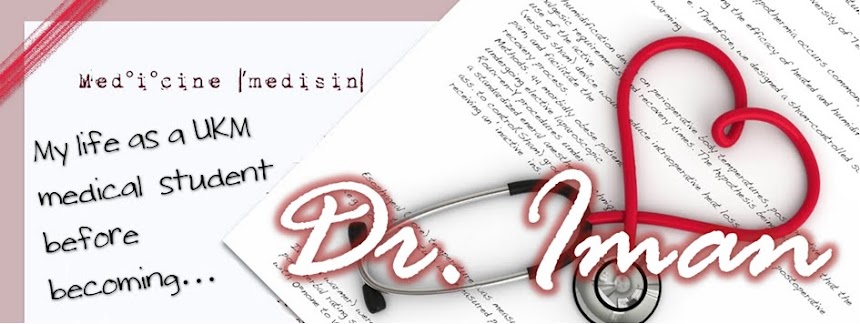After more than 5 years being a medical student, I’m glad I manage to finally learn this before I started working. Of course, I still find that what my mum keeps telling me is partly true ; “being friends with doctors are boring… All they know is to talk about medical stuff and they are only good in socializing with their own kind”. Yes, I’ve seen it, unfortunately… Which is why I’m glad I am a part of a big family that talks about more important things in life at least once a week… hehehe….
I’ve been a friend of patients in the Obstetric ward that sometimes I visit at her workplace here in the social service of PPUKM, and one that wanted to name her newborn baby “iman”. I’ve been friends of most of my case write up patients, even though mostly it’s because I wanted to get the PPD part…(oh dear me!hohoho….), friends of at 3 psychiatric patients with different diagnosis and a few others. Well, not that much really.
This is really something that PPD doesn’t really go details, but being able to befriend with patients is actually that shortcut to getting to all that communication, spiritual, ethical, etc issues that we’re supposed to instill within our hearts as doctors.
Today I made a visit to a friend, an akhawat, at the psychiatric ward. Kak Raja have been in and out of the ward for the past few years. For those who don’t know the story yet, she had been diagnosed with Bipolar II disorder few years back. Currently, the issue is that there might be some Axis II involvement. She is also having trouble with support from the family, trouble with employment, and with the disease currently on the relapse. For those who had most probably forgotten about Bipolar II disorder, here’s a quick recap:
- Presence (or history) of one or more Major Depressive Episodes
- Presence (or history) or at least one Hypomanic Episode
- There has never been a Manic Episode or a Mixed Episode
- The mood symptoms in Criteria A and B not better accounted for by Schizoaffective Disorder and is not superimposed on Schizophrenia, Schizophreniform Disorder, Delusional Disorder, or Psychotic Disorder Not Otherwise Specified.
- The symptoms cause clinically significant distress or impairment in social, occupational, or other important areas of functioning.
Its difficult to understand the patients feelings and what they have to put up with, let alone psychiatrict patients. In this case, someone involves in tarbiyyah… We know that studies had shown that religion is one of the protective factors against psychiatric diorders. But, “studies” does not follow Allah’s rule per say. Being clinical-evidence oriented people, we tend to forget that, and the one that suffer the stigma will be the patients themselves. How do feel about that?
The similitude of the believers in their compassion, mercy, and affection toward each other is like a single body. When one organ ails, the whole body suffers and reacts.
When one organ ails, the whole body suffers and reacts.
When one organ ails, the whole body suffers and reacts.
When one organ ails, the whole body suffers and reacts.
Being a muslim… how much do we feel this suffer? How much have we done to help?
There is nothing I can do much beside offering my friendship as an act of kindness to relieve one’s heartache from a disease with not such a good prognosis.
Being a muslim… we are taught that action speaks louder than words and to walk the talk.
With all the talk, when will the walk start? They say “start now, start small, and start with the closest one to you…”
If I’m not making my point any clearer, let me just end this post with a hadith, one that I pasted beside the door of my house (which I frequently forget to read everyday before going to the ward):
Wallahualam....


Jazakillahu khairan katheera ukhti iman...... thats all i can comment...
ReplyDelete